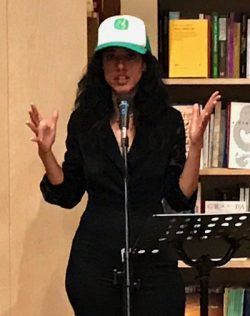#884 Decolonizing Shakespeare
Sonnet’s Shakespeare
by Sonnet L’Abbé
Toronto: Penguin Random House (McClelland & Stewart), 2019
$21.00 / 9780771073090
Reviewed by Natalie Lang
*
On March 12, 2020, Sonnet’s Shakespeare, by Sonnet L’Abbé, was one of five books shortlisted for the 2020 Dorothy Livesay Poetry Prize of the BC and Yukon Book Prizes. Winners will be announced on September 19th – Ed.
*
 “What’s in a name?” Is Shakespeare the transcendent voice of Western culture or a symbol of colonization? Sonnet L’Abbé, professor of Creative Writing at Vancouver Island University and author of two previous collections of poetry, A Strange Relief (2001) and Killarnoe (2007), addresses some tensions and fissures of her own and Canadian identity. Using Shakespeare’s sonnets as her source, L’Abbé challenges the Bard’s colonial influence and hold on Western identity. By overwriting and writing around the original sonnets, breaking apart words and filling in spaces, she aims to erase Shakespeare’s colonial power by rewriting his 154 sonnets with a revised focus aimed at deliberate decolonization.
“What’s in a name?” Is Shakespeare the transcendent voice of Western culture or a symbol of colonization? Sonnet L’Abbé, professor of Creative Writing at Vancouver Island University and author of two previous collections of poetry, A Strange Relief (2001) and Killarnoe (2007), addresses some tensions and fissures of her own and Canadian identity. Using Shakespeare’s sonnets as her source, L’Abbé challenges the Bard’s colonial influence and hold on Western identity. By overwriting and writing around the original sonnets, breaking apart words and filling in spaces, she aims to erase Shakespeare’s colonial power by rewriting his 154 sonnets with a revised focus aimed at deliberate decolonization.
L’Abbé’s starting point is that her own personal and complex racial history does not easily fit the conventional narrative of what it means to be Canadian. She explores her identity as a half-dougla (South-Asian and Black) woman in a world where reconciliation, environmentalism, sexual violence, mental health, gender identity, privilege, and racism, among other high-frequency topics, are brought to the collective consciousness. She flips the common yet invisible practice of cultural erasure in our supposed multicultural country and overwrites the ultimate source of that erasure. She encourages new dialogue and conversation. She advocates less a melting pot of cultures and more of a conversational medley where flavours speak for themselves.


Sonnet’s Shakespeare is organized with recognition of the traditional unceded territories of the people on whose land the poems were written, including the Sylix (Kelowna), the Haldimand Tract (Kitchener-Waterloo), and Snuneymuxw (Nanaimo). L’Abbé provides a short explanation on the procedure used to write the poems. Each is titled with Latin numerals aligned identically to Shakespeare’s numbers. Every letter from the original can be found in order within the new poems. In some, Shakespeare’s letters are printed in light grey to help the reader see both the original and the reimagined sonnets. Within her alternative erasure form, L’Abbé’s painstaking wordplay continues the iambic rhythm of stressed and unstressed syllables found in Shakespeare’s originals, for example in Sonnet XLII:
Threading culture through Shakespeare, I confront my inheritance, mis-/
given. Not all my grief is language, yet it may be said: this locution/
grieves. I am daughter of tides of war…

For L’Abbé, the purpose of the collection is to take hold of Shakespeare’s colonial influence and break apart the ideology that suggests that to read him is to be civilized. She attempts to erase Shakespeare’s cultural grasp over her own writing by empowering her own voice, born from her cultural and life experience, and to eliminate Western behavioural archetypes created by Shakespeare’s global presence. She looks to “un-remember” the colonial versions of herself and the construction of her Canadian identity according to the accepted narrative, and then to rewrite that narrative.
Sonnet’s Shakespeare is as much self-exploratory as a breakthrough of voices surrounding the received notions of culture and diversity in Canada. L’Abbé stresses the importance of telling our own cultural stories and listening to others. In Sonnet XLII, where Shakespeare’s original poem hosts lines such as, “Loving offenders, thus I will excuse ye:/ Thou dost love her because thou know’st I love her,” L’Abbé writes:
… through this appropriate voice we find each other, angry and/
guilty, oppressed and bossy, the twains that my hindbrain, tongue-tied,/
stomachs. For memory’s sake I lay aggroculture on memory’s thespian/
scripture….

As a mixed black, female settler and immigrant on stolen land, L’Abbé, like many others, grew up with multicultural myths against which she continues to struggle by discovering her own stories. As she works to unpack those myths amidst the traumas that life doled out, she reminds herself and readers, in Sonnet XXI, to “… sing while learning to interpret pain,” a habit that displays the power and freedom gained from breaking through established systems and learning to use one’s own voice.
Sonnet’s Shakespeare is a remarkable read. Its depth and awareness constantly challenge the status quo. The poems encourage us to ask important questions and peer through the colonial veil. In this month of July 1st celebrations, L’Abbé offers opportunities to clarify what Canada has not yet found the space to explore. Canada is more than a melting pot of culture feeding into a single story. In L’Abbé’s vision, it is a mosaic identity consisting of unique and individual tales, separate from colonization, and it is more complex and diverse than the mono-narrative we’ve been participating in.
L’Abbé has created, in this massive undertaking of layered and complex language, themes and challenges that centre around place, identity, and the possibility of healing and discovery. She challenges what it means as a person of colour finding her own cultural narrative in Canada and within the larger the Western world. Through crafting poetry around the dominant Shakespearean voice, L’Abbé discovers her own story and finds space for herself and her readers to challenge accepted canons of cultural history and awaken more complex identities of multiplicity and diversity. This layered and ambitious book of poetry offers space for growth, understanding, and questioning received notions of Canadian identity.
*

Natalie Lang is a teacher at Rick Hansen Secondary in Abbotsford. She graduated from the University of the Fraser Valley with a Bachelor of Arts degree in English Literature and Anthropology and then completed the PDP (Professional Development Program) and Bachelor of Education at Simon Fraser University. She is now a master’s student in the GLS (Graduate of Liberal Studies) program at Simon Fraser University. Natalie lives to the beat of her own drum, allowing experience and life circumstances to help determine where she goes, what she does, and how she lives. As such, she has lived in China, walked across Spain, and travelled to many areas of the world. Natalie now lives in a renovated barn in the Fraser Valley where she can be found studying for her GLS classes, designing lessons for her students, listening to records, and dabbling with her own experiments in writing. Editor’s note: For The Ormsby Review, Natalie has reviewed books by Larry Hannant, Tanya dePape, Emily Lycopolus, Alicia Tobin, and Cait Flanders.
*
 The Ormsby Review. More Books. More Reviews. More Often.
The Ormsby Review. More Books. More Reviews. More Often.
Publisher and Editor: Richard Mackie
The Ormsby Review is a journal service for in-depth coverage of B.C. books and authors. The Advisory Board consists of Jean Barman, Robin Fisher, Cole Harris, Wade Davis, Hugh Johnston, Patricia Roy, David Stouck, and Graeme Wynn. Scholarly Patron: SFU Graduate Liberal Studies. Honorary Patron: Yosef Wosk. Provincial Government Patron since September 2018: Creative BC
“Only connect.” – E.M. Forster
2 comments on “#884 Decolonizing Shakespeare”